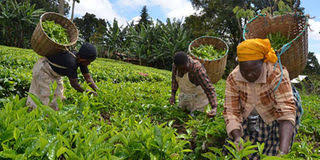A new legislative proposal, the Tea (Amendment) Bill 2023, has sparked concerns over the financial stability of Kenyan tea farmers, as it seeks to overhaul the allocation of revenue collected from tea levies.
The bill, tabled in Parliament this week by Bomet Senator Hillary Sigei and Konoin MP Brighton Yegon, suggests redistributing 60 per cent of the 1 per cent tea export tax to the Tea Board of Kenya (TBK) and 40 per cent to the Tea Research Foundation.
This marks a departure from the current Tea Act, which earmarks 50 per cent of TBK revenue for direct farmer support and price stabilisation, alongside allocations for infrastructure development and research.
Tea, a cornerstone of Kenya's agricultural exports, generated Sh180.57 billion in revenue in 2023, up from Sh138.09 billion in 2022.
Had the 1 per cent export levy, introduced under the Tea Act of 2020, been enforced, TBK could have collected an estimated Sh1.8 billion in revenue last year.
Read More
However, this levy remains unenforced due to ongoing legal challenges from tea companies, which have labelled it unconstitutional.
The Tea Act of 2020 promised a secure funding model for farmers, ensuring a buffer against price fluctuations through a dedicated Tea Fund. Under the new proposal, this assurance is set to vanish.
Funds aimed at stabilising prices would instead rely on allocations from the national budget, contingent upon approval by the National Assembly.
For TBK, which has so far relied on government funding, the amendment would offer a more predictable revenue stream.
However, critics argue this comes at the expense of farmers, who would lose their guaranteed share of the revenue.
If enacted, the bill would give TBK discretion over how much of the collected tax revenue it allocates to farmers.
While the existing Tea Act balances operational, research, and farmer support priorities, the proposed changes have drawn attention to their potential impact on the industry’s most vulnerable stakeholders.
Tea farmers, who have long relied on structured support mechanisms, now face a future of uncertainty amidst fluctuating global prices.
The Tea (Amendment) Bill 2023 arrives at a time when the tea sector is grappling with increased legal and economic challenges.
Stakeholders are anxiously awaiting Parliament’s decision, as the shift in funding priorities threatens to reshape Kenya’s tea landscape.






-1731675695.jpg)

